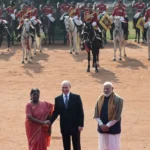Oxford University Chancellor Lord William Hague has praised Australia’s “bold and responsible” move to ban social media for children under 16, calling it a landmark step in protecting young people’s mental health and civic integrity.
Speaking at the Britain-Australia Society’s President’s Reception at Australia House in London, Lord Hague said he hopes the United Kingdom will follow Australia’s lead, becoming the next country to introduce strict age-based restrictions.
“Australia has, in my view, an excellent policy. Social media platforms operate on addictive models that thrive on anger and division. We must learn to live with them — but also to regulate them,” he said.
Lord Hague, who became Oxford’s 160th Chancellor in 2024, emphasised that safeguarding young people from online harm and rebuilding respectful public discourse should be top priorities for all democratic societies.
Criticism of Albanese government’s recognition of Palestine
In a separate part of his speech, the former UK Foreign Secretary (2010) and Conservative Leader (1997–2001) sharply criticised the Albanese government’s decision to recognise Palestinian statehood.
“I’m deeply critical of some recent actions by Israel, but this war began when Hamas attacked Israel,” Hague said. “I would not have recognised Palestine before the hostages were freed. It was wrong to give up that leverage.”
He stressed that while condemning Israeli excesses is necessary, ongoing violence “makes the creation of a viable Palestinian state impossible,” and warned that premature recognition risks undermining peace efforts.
Positive assessment of Trump-Netanyahu peace plan
Lord Hague also welcomed the 20-point peace plan unveiled by US President Donald Trump and Israeli Prime Minister Benjamin Netanyahu, describing it as “serious, constructive, and potentially transformative” if fully implemented.
He said the plan — which reportedly includes the participation of former UK Prime Minister Sir Tony Blair in a governing body for “eternal peace in the Middle East” — could help rescue Gaza’s population from its humanitarian crisis.
However, he admitted that Hamas is unlikely to agree, despite the plan’s ambitious framework for stability and reconstruction.
Universities, protests, and free speech
Turning to domestic issues, Lord Hague spoke about the rise in campus protests — including at Oxford — and warned of mounting threats to freedom of speech and thought.
“Civilised debate and the willingness to listen respectfully to opposing views are foundations of democracy. Social media, unfortunately, erode that culture,” he noted.
Following the event, Britain-Australia Society CEO Louise Mulley said it was a privilege to host Lord Hague, describing his engagement as a “testament to the enduring strength of the Australia–UK partnership.”












